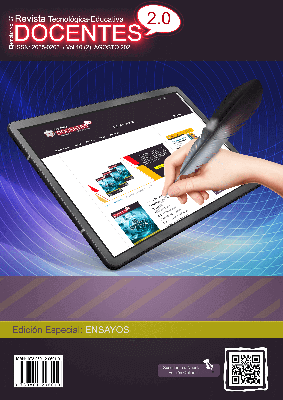Educational Technology in the Teacher Training Process
 DOI:
https://doi.org/10.37843/rted.v10i2.206
DOI:
https://doi.org/10.37843/rted.v10i2.206
Main Article Content
Abstract
In this essay, a tour was made of traditional teaching materials and new technologies that have been implemented in teacher training. It was conducted under the premise that education should be designed to cultivate and foster new skills. At present, reference is made to digital literacy. These competencies, necessary in this age, must be improved, redesigned, and rethought from a new perspective. The enormous technological changes that the modern world is experiencing are also transforming social relations. In this context, information is the new engine of progress. Without quality education for all, a knowledge society is impossible. Therefore, faced with emerging skills and new cultures, teachers must take on the challenge of promoting universal access to technologies and the skills necessary to guarantee their use. This line sought to highlight the importance of training in teacher training on new technologies and their implementation in the educational process to improve and promote student learning.
Downloads
Metrics
Article Details

This work is licensed under a Creative Commons Attribution-NonCommercial-NoDerivatives 4.0 International License.
Those authors who have publications in our journal accept the following terms:
- When a work is accepted for publication, the author retains rights of reproduction, distribution of his/her article for exploitation in all countries of the world in the format provided by our magazine and any other magnetic medium, optical, and digital.
- Authors will retain their copyright and guarantee the journal the right first to publish their work, which will be simultaneously subject to the Creative Commons Acknowledgment License (Attribution-NonCommercial-NoDerivatives 4.0 International (CC BY-NC-ND 4.0)). That allows third parties to copy and redistribute the material in any medium or format, under the following conditions: Acknowledgment - You must properly acknowledge authorship, provide a link to the license, and indicate if any changes have been made. You may do so in any reasonable way, but not in a way that suggests you have the licensor's endorsement or receive it for your use. NonCommercial - You may not use the material for a commercial purpose. NoDerivatives - If you remix, transform, or build from the material, you cannot broadcast the modified material. There are no additional restrictions - You cannot apply legal terms or technological measures that legally restrict you from doing what the license allows.
- Authors may adopt other non-exclusive license agreements to distribute the published version of the work (e.g., deposit it in an institutional archive or publish it in a monographic volume) provided that the initial publication in this journal is indicated.
- Authors are allowed and recommended to disseminate their work through the Internet (e.g., in institutional telematic archives, repositories, libraries, or their website), producing exciting exchanges and increasing the published work's citations.
- Request of withdrawal an article has to be done in writing by the author to the Editor, becoming effective after a written response from the Editor. For this purpose, the author or authors will send correspondence via e-mail: [email protected].
- The author will not receive financial compensation for the publication of his work.
- All Docentes 2.0 Journal publications are under the Open Journal System (OJS) platform at: https://ojs.docentes20.com/.
References
Area-Moreira, M. (2007). Los Materiales Educativos: Origen y Futuro. En IV Congreso Nacional de Imagen y Pedagogía en Veracruz. Universidad de la Laguna.
Bravo-Ramos, J.L. (2003). Los Medios Tradicionales de la Enseñanza: Uso de la Pizarra y los Medios Relacionados. Universidad Politécnica de Madrid.
Cañete-Estigarribia, D. L. (2021). Competencia Digital Docente en el Contexto Paraguayo. En Revista Tecnológica Educativa Docentes 2.0, 11(1), 36–46. https://doi.org/10.37843/rted.v11i1.183 DOI: https://doi.org/10.37843/rted.v11i1.183
Consejo Nacional de Educación y Ciencias [CONEC] (2003). Situación de la Educación en Paraguay. Ediciones y Arte S.R.L.
Cuevas-Cordero, F. & García Fallas, J. (2014). Las TIC en la Formación Docente. En Memorias del Congreso Iberoamericano de Ciencia, Tecnología, Innovación y Educación. Secretaría general de la OEI.
Fernández-Portero, I. (2018). Diseño Universal para el Aprendizaje de Idiomas en Personas con Diversidad Funcional. En Revista Nacional e Internacional de Educación Inclusiva, 11 (1), 251-266. Universidad de Extremadura. https://revistaeducacioninclusiva.es/index.php/REI/article/view/319/328
Fondevila, J. F. (2007). Cable en España, 2006. Cecable
Huerta, J. (2016). La Interesante Historia del Pizarrón Escolar. Unión. https://www.unioncancun.mx/articulo/2016/11/29/educacion/la-interesante-historia-del-pizarron-escolar#:~:text=El%20primer%20pizarr%C3%B3n,mejor%20lo%20que%20estaba%20explicando
Marqués, P. (2013). Impacto de las TIC en la Educación: Funciones y limitaciones. En Revista de investigación Editada por Área de Innovación y Desarrollo, 2(1), 1-15. Obtenido de https://dialnet.unirioja.es/descarga/articulo/4817326.pdf
Lion, C. (2019). Análisis comparativo de Políticas de Educación. los Desafíos y Oportunidades de Incluir Tecnologías en las Prácticas Educativas. Análisis de Casos Inspiradores. Instituto Interamericano de Planeación de la Educación (IIPE)- Unesco.
López-Jiménez, D.F. (2006). El Conocimiento y la Comunicación: Dos Pilares Fundamentales de la Organización de la Sociedad de la Información. En Palabra Clave, vol. 9, núm. 2, 2006, pp. 91-109. Universidad de La Sabana.
López-Jiménez, D.F. (2007). La Naturaleza de las Tecnologías de Información y Comunicación: las TIC como Determinantes de la Organización y de la Sociedad de la Información. En Palabra Clave, vol. 10, núm. 1, pp.72-93. Universidad de La Sabana.
Polo, L. (1993). Presente y Futuro del Hombre. Ediciones Rialp.
Rodríguez-Guerrero, U. (2003). Entre la Pizarra y el Monitor, ¿Es Posible esa Transición? En Revista Tecnología En Marcha, 17(3), pág. 152-153
Shallis, M. (1986). El Ídolo del Silicio. Biblioteca Científica Salvat.
Tedesco, J. (2007). Las TIC en la Agenda de la Política Educativa, en Las TIC: del Aula a la Agenda Política. IIPE Unesco y UNICEF Argentina.
Unesco (2013). Enfoques Estratégicos sobre las TIC en Educación en América Latina y el Caribe. Oficina Regional de Educación para América Latina y el Caribe.
Venegas-Ramos, L., Luzardo-Martínez, H. J., & Pereira-Santana, A. (2020). Conocimiento, Formación y Uso de Herramientas TIC Aplicadas a la Educación Superior por el Profesorado de la Universidad Miguel de Cervantes. En Edutec. Revista Electrónica De Tecnología Educativa, (71), 35-52. DOI: https://doi.org/10.21556/edutec.2020.71.1405






